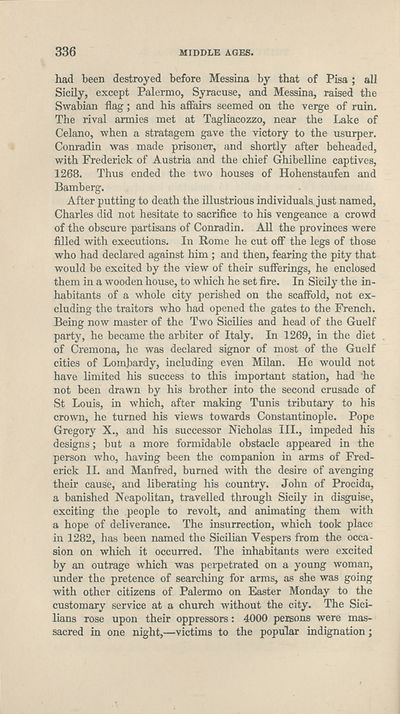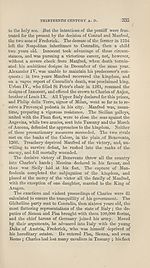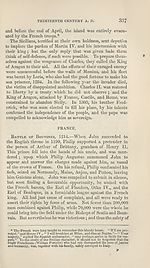Download files
Complete book:
Individual page:
Thumbnail gallery: Grid view | List view

336
MIDDLE AGES.
had been destroyed before Messina by that of Pisa ; all
Sicily, except Palermo, Syracuse, and Messina, raised the
Swabian flag; and his affairs seemed on the verge of ruin.
The rival armies met at Tagliacozzo, near the Lake of
Celano, when a stratagem gave the victory to the usurper.
Conradin was made prisoner, and shortly after beheaded,
with Frederick of Austria and the chief Ghibelline captives,
1268. Thus ended the two houses of Hohenstaufen and
Bamberg.
After putting to death the illustrious individuals just named,
Charles did not hesitate to sacrifice to his vengeance a crowd
of the obscure partisans of Conradin. All the provinces were
filled with executions. In Rome he cut off the legs of those
who had declared against him ; and then, fearing the pity that
would be excited by the view of their sufferings, he enclosed
them in a wooden house, to which he set fire. In Sicily the in¬
habitants of a whole city perished on the scaffold, not ex¬
cluding the traitors who had opened the gates to the French.
Being now master of the Two Sicilies and head of the Guelf
party, he became the arbiter of Italy. In 1269, in the diet
of Cremona, he was declared signor of most of the Guelf
cities of Lombardy, including even Milan. He would not
have limited his success to this important station, had he
not been drawn by his brother into the second crusade of
St Louis, in which, after making Tunis tributary to his
crown, he turned his views towards Constantinople. Pope
Gregory X., and his successor Nicholas III., impeded his
designs; but a more formidable obstacle appeared in the
person who, having been the companion in arms of Fred¬
erick II. and Manfred, burned with the desire of avenging
their cause, and liberating his country. John of Procida,
a banished Neapolitan, travelled through Sicily in disguise,
exciting the people to revolt, and animating them with
a hope of deliverance. The insurrection, which took place
in 1282, has been named the Sicilian Vespers from the occa¬
sion on which it occurred. The inhabitants were excited
by an outrage which was perpetrated on a young woman,
under the pretence of searching for arms, as she was going
with other citizens of Palermo on Easter Monday to the
customary service at a church without the city. The Sici¬
lians rose upon their oppressors: 4000 persons were mas¬
sacred in one night,—victims to the popular indignation;
MIDDLE AGES.
had been destroyed before Messina by that of Pisa ; all
Sicily, except Palermo, Syracuse, and Messina, raised the
Swabian flag; and his affairs seemed on the verge of ruin.
The rival armies met at Tagliacozzo, near the Lake of
Celano, when a stratagem gave the victory to the usurper.
Conradin was made prisoner, and shortly after beheaded,
with Frederick of Austria and the chief Ghibelline captives,
1268. Thus ended the two houses of Hohenstaufen and
Bamberg.
After putting to death the illustrious individuals just named,
Charles did not hesitate to sacrifice to his vengeance a crowd
of the obscure partisans of Conradin. All the provinces were
filled with executions. In Rome he cut off the legs of those
who had declared against him ; and then, fearing the pity that
would be excited by the view of their sufferings, he enclosed
them in a wooden house, to which he set fire. In Sicily the in¬
habitants of a whole city perished on the scaffold, not ex¬
cluding the traitors who had opened the gates to the French.
Being now master of the Two Sicilies and head of the Guelf
party, he became the arbiter of Italy. In 1269, in the diet
of Cremona, he was declared signor of most of the Guelf
cities of Lombardy, including even Milan. He would not
have limited his success to this important station, had he
not been drawn by his brother into the second crusade of
St Louis, in which, after making Tunis tributary to his
crown, he turned his views towards Constantinople. Pope
Gregory X., and his successor Nicholas III., impeded his
designs; but a more formidable obstacle appeared in the
person who, having been the companion in arms of Fred¬
erick II. and Manfred, burned with the desire of avenging
their cause, and liberating his country. John of Procida,
a banished Neapolitan, travelled through Sicily in disguise,
exciting the people to revolt, and animating them with
a hope of deliverance. The insurrection, which took place
in 1282, has been named the Sicilian Vespers from the occa¬
sion on which it occurred. The inhabitants were excited
by an outrage which was perpetrated on a young woman,
under the pretence of searching for arms, as she was going
with other citizens of Palermo on Easter Monday to the
customary service at a church without the city. The Sici¬
lians rose upon their oppressors: 4000 persons were mas¬
sacred in one night,—victims to the popular indignation;
Set display mode to:
![]() Universal Viewer |
Universal Viewer | ![]() Mirador |
Large image | Transcription
Mirador |
Large image | Transcription
| Antiquarian books of Scotland > Education > Elements of universal history on a new and systematic plan > (356) |
|---|
| Permanent URL | https://digital.nls.uk/127584412 |
|---|
| Description | Thousands of printed books from the Antiquarian Books of Scotland collection which dates from 1641 to the 1980s. The collection consists of 14,800 books which were published in Scotland or have a Scottish connection, e.g. through the author, printer or owner. Subjects covered include sport, education, diseases, adventure, occupations, Jacobites, politics and religion. Among the 29 languages represented are English, Gaelic, Italian, French, Russian and Swedish. |
|---|

